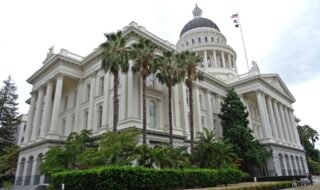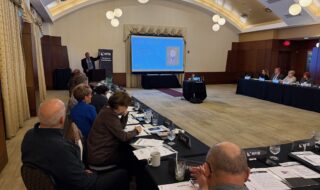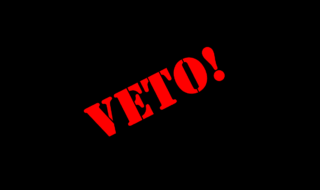October 21, 2025
A few pro-small-business bills squeezed through many bad ones
The 2025 session of the California State Legislature might be as notable for what didn’t come out of it as for what did. Unlike in past sessions, gaining absolutely no traction were ideas for:
— abolishing private health insurance and replacing it with a universal health-care scheme
— opening up the state’s unemployment insurance trust fund to people already with jobs who voluntarily go out on strike in the security that UI benefits will cover their temporary absence
— raising the state’s minimum-wage rate.
Also not coming out of the 2025 session were three horrendously bad bills for small business that failed to advance out of key Senate committees.
— The worst, by far, was Senate Bill 222 (Wiener), which would have opened up whole new opportunities for litigation under the guise of climate change. Thank you, NFIB members, for making your opposition known through your Action Alert.
— Senate Bill 799 (Allen), greatly expanding the False Claims Act to include confidential records, like SB 222, failed to make it out key Senate committees.
— And in June, Senate Bill 310 (Wiener), which would have undone all the reforms to the Private Attorneys General Act (PAGA) that NFIB and its coalition partners had fought for years, was moved to the inactive file by the bill’s author.
More Good News
Two measures, Assembly Bill 609 (Wicks) and Senate Bill 607 (Wiener), curbing the abusive use of the California Environmental Quality Act (CEQA) to delay or halt housing construction, a reform long fought for by NFIB, were folded into the state budget and passed.
Add to the above, Assembly Bill 671 (Wicks), streamlining the approval process for some businesses, and Senate Bill 72 (Caballero), calling for better planning in the state’s future water needs, and you have all of the pro-small-business legislation to come out of the 2025 session.
Sigh of Relief
While on the topic of good news, we should give a fleeting bit of credit (fleeting because he’ll revert to type soon enough) to Gov. Gavin Newsom for vetoing some very bad for small business legislation.
— The most notorious of the vetoed bills was Senate Bill 512 (Perez), an end-run around Proposition 13 property tax protection that would have authorized the voters of any district that has authority to impose a transactions and use tax for transportation purposes to impose a retail transactions and use tax by an initiative measure. NFIB and its coalition partners’ letter of opposition to the State Assembly can be read here. The coalition’s ‘Request for Veto’ letter to the governor can be read here.
— His veto of Assembly Bill 1136 (Ortega) was also good news. It would has given employees up to five days of leave to attend appointments, interviews, adjudications, legal proceedings, detainment, or any other meeting. ‘Request for Veto’ letter here.
— The governor’s veto of Senate Bill 7 (McNerney) was also commendable. It would have required an employer, or a vendor engaged by the employer, to provide a written notice that an ADS [automated decision systems], for the purpose of making employment-related decisions, is in use at the workplace to all workers that will be directly or indirectly affected by the ADS.
— Vetoes of Assembly Bill 1336 (Addis) on heat-related injuries (letter here) and of Senate Bill 404 (Caballero) on metal shredding (letter here) rounded out the good news to come out of the session.
On to The Bad News
Also gaining no traction was any serious consideration of paying down or off the state’s $20 billion in UI loans it has outstanding with the federal government, giving California the ignominious distinction of being the only state that hasn’t settled up with Uncle Sam for the money it borrowed to keep its pandemic-ravaged unemployment insurance trust fund up and running.
Re-visiting this issue will be NFIB’s top lobbying goal in 2026.
So, how did small businesses fare legislatively in a state under one-party control by big margins in both Assembly and Senate and within that party, guided by its progressive wing? It should be remembered that former Assembly Speaker Anthony Rendon, a progressive, was tossed out because he wasn’t progressive enough and replaced with Robert Rivas, whose progressivism is running up against the realities of life.
The arrogance of it all
Among the 10 bad-for-small-business bills NFIB lobbied hardest against was Assembly Bill 288 (McKinnor), which, in a nutshell, seeks to enforce workers’ collective bargaining rights for certain private sector employees when the federal National Labor Relations Board (NLRB) fails to act in a “timely manner,” thereby usurping federal authority. It would give these enforcement powers to the state Public Employment Relations Board (PERS).
NFIB does not believe AB 288 can pass legal muster and is involved in a similar case in New York, NFIB Pushes Back on New York’s Attempt to Upend Longstanding Labor Law.
The other nine bad-for-small-business bills on NFIB’s lobbying list signed into law were (text provided by Legislative Counsel):
— Assembly Bill 692 (Kalra) “Existing law declares every contract by which anyone is restrained from engaging in a lawful profession, trade, or business of any kind to be void, except as expressly provided. … The bill would authorize a person, including a local government or a worker representative, to bring a civil action on behalf of the person or other persons similarly situated to establish liability against an employer, and provide that a person who violates these provisions is liable for specified civil penalties and relief.” NFIB and its coalition partners’ letter of opposition can be read here. A September 3 Floor Alert can be read here.
— Assembly Bill 1340 (Wicks) “This bill … would establish that transportation network company (TNC) drivers have the right to form, join, and participate in the activities of TNC driver organizations of their own choosing to engage in other concerted activities for the purpose of collective bargaining or other mutual aid or protection.”
— Senate Bill 82 (Umberg) “This bill would, for a consumer use agreement, limit the dispute resolution terms and conditions to the use, payment, or provision of the good, service, money, or credit provided by the consumer use agreement.” Click here for an Assembly Floor Alert with more details. NFIB and its coalition partners September 18 ‘Request for Veto’ letter can be read here. A second ‘Request for Veto’ letter was sent September 24.
— Senate Bill 261 (Wahab) concerning wage theft and other labor laws. “This bill would require the commissioner to post a copy of the order, decision, or award on the division’s internet website, as specified, no later than 15 days after the time to appeal from the order, decision, or award has expired and no appeal therefrom is pending.” Business coalition letter of opposition here.
— Senate Bill 294 (Reyes) “… would establish the Workplace Know Your Rights Act. The bill would require an employer to annually provide a stand-alone written notice to each current employee, and to each new employee upon hire, of workers’ rights under state and federal law.” NFIB and its coalition partners’ letter of opposition can be read here.
— Senate Bill 464 (Smallwood-Cuevas) “Existing law requires a private employer that has 100 or more employees to submit an annual pay data report to the Civil Rights Department that includes the number of employees by race, ethnicity, and sex in specified job categories, whose pay falls within federal pay bands, and within each job category the median and mean hourly rate for each combination of those characteristics as specified. This bill would also expand the demographics for the reporting requirements to also include sexual orientation and require the report to include information by sexual orientation about the number of employees in specified job categories, whose pay falls within federal pay bands, and within each job category the median and mean hourly rate for each combination of the specified characteristics. NFIB and its coalition partners’ letter of opposition can be read here.
— Senate Bill 590 (Durazo) “… would … expand eligibility for benefits under the paid family leave program to … define designated person to mean any individual related by blood or whose association with the employee is the equivalent of a family relationship.”
— Senate Bill 642 (Limon) “This bill would revise the definition of ‘pay scale’ to mean an estimate of this expected wage range that is made in good faith.” NFIB and its coalition’s letter of opposition can be read here. ‘Request for Veto’ letter here.
— Senate Bill 809 (Durazo) “… would provide that mere ownership of a vehicle, including a personal vehicle or a commercial vehicle, or other tools, used by a person in providing labor or services for remuneration does not make that person an independent contractor.”
Concluding Observations
— The Legislature adjourned its 2025 session on September 13, one day later than scheduled. Gov. Gavin Newsom had until October 12 to act on the bills sent to him. Some measures not sent to him will carry over to the second half of 2025-2026 session, which begins on January 5, 2026. From the 2,883 bills to emerge out of the 2025 session, NFIB narrowed to 61 the number of measures it lobbied for or against or monitored.
— Badly need CEQA reform was successfully pushed by two of the Legislature’s more progressive members, Assemblymember Buffy Wicks (D-Berkeley) and Sen. Scott Wiener (D-San Francisco), perhaps in response to or concomitant with the publication of Abundance by Ezra Klein and Derek Thompson, which claimed California’s housing policies were the biggest contributor to the state’s homeless crisis.
— Two of NFIB’s agenda items for 2026 will be paying down the state’s UI debt (mentioned above) and working with Sen. Roger Niello on his idea to use the PAGA reforms on the misuses of the Americans With Disabilities Act, California showed progress with PAGA — now let’s do the same for ADA.
— As always, NFIB successes are tied to its members’ engagement, an example of which can be found in this web story, NFIB Members Thanked for Protecting Proposition 13.
— Not an NFIB member? Join here.
NFIB is a member-driven organization advocating on behalf of small and independent businesses nationwide.
Related Articles














